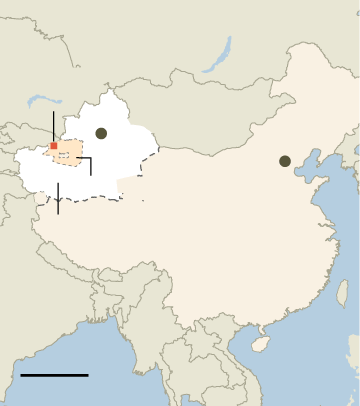
By CHRIS BUCKLEY
FEB. 14, 2014
HONG KONG — The police in Xinjiang, the ethnically divided region in far western China, fatally shot eight people on Friday after what the state-run news media described as an attack by assailants armed with bombs made from gas cylinders. Three other attackers died in an explosion they set off, the reports said.
The official accounts did not identify the bombers, but it was clear that they were Uighurs, a Turkic people who have grown increasingly resentful of the growing numbers of ethnic Han Chinese in the region and of state controls on their culture and Muslim religion. The accounts called the assailants terrorists, as have many previous official reports describing clashes with Uighurs.
The violence erupted in Wushi County, in Aksu Prefecture, when people riding motorbikes and a person driving a car loaded with natural-gas cylinders bore down on police officers preparing to go on patrol, said Xinhua, the state-run news agency. The attackers also used knives, said Tianshan Net, an official Xinjiang news portal. Wushi is called Uqturpan by Uighurs.
“In the course of responding, the public security police shot dead eight people and captured one,” said the report from Tianshan Net. “Three suspects died while carrying out their crime by blowing themselves up.”
Two police officers were wounded, as were two members of the public, the report said. Tianshan showed a photograph of a burned-out police patrol vehicle with a crushed front, as well as one of the charred shell of a jeep with shattered windows. Officials in Wushi refused to comment.
Xinjiang has long been troubled by ethnic divisions, but the increasing frequency of violence suggests that tensions are worsening. Even before the latest deaths, nearly three dozen Uighurs had been fatally shot by the police in southern Xinjiang since late last year. The latest confrontation followed a deadly clash in another part of Aksu Prefecture, in southwest Xinjiang, in which six men who attacked a police station were killed by security forces on Jan. 24, Xinhua said.
Ethnic enmities in Xinjiang have deepened since July 2009, when at least 200 people died in Urumqi, the regional capital, where Uighur men attacked Han Chinese people on the street. Han Chinese crowds retaliated by attacking Uighur neighborhoods.
The Chinese government has attributed the violence to Uighurs inspired by Islamic extremism and supported from abroad. Advocates of Uighur self-determination, however, say the government’s aggressive security policies have provoked eruptions of violence by despairing Uighurs armed with primitive weapons. Uighurs make up about 46 percent of Xinjiang’s 21.8 million residents, according to government data, and many Uighurs say that growing numbers of Han Chinese are depriving them of jobs, land and business opportunities.
Last month, security officials in Xinjiang accused a detained Uighur scholar, Ilham Tohti, of fomenting separatism and ethnic hatred. Mr. Tohti, an economist who taught in Beijing, had argued that tensions in Xinjiang arose from frustration among Uighurs about discrimination and deprivation.
Bree Feng contributed research from Beijing.
